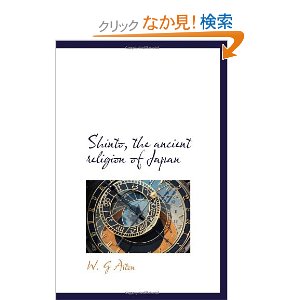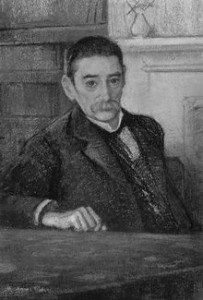‘Shinto: The Way of the Gods’ by W.G. Aston London: Longmans, Green and Co, 1905 390 pages, medium size. ISBN 1-4179-4872-8 $23.07
Together with Ernest Satow and B.H. Chamberlain, W.G. Aston (1841-1911) was one of the early giants of Japanese studies. He was Anglo-Irish, a British diplomat who served in Korea and something of a genius too. Accomplished in literature, linguistics, and history, he was the translator of Nihongi and an authority on Shinto. The book he wrote on the subject is erudite as well as readable. His classical education enables him to make comparisons with ancient Greece, and he displays familiarity too with Chinese and Asian traditions. The book helps to contextualise early Shinto, highlighting the Asian origins of its rites and beliefs. As with Percival Lowell, Aston wrote in an age when religious expression was much richer than at present, and there are references throughout to customs which have since died out. Although he portrays Shinto as ‘primitive’ compared with Buddhism, lacking altruistic morality and an intellectual framework, he displays a familiarity with the complexities of the religion that one suspects even Shinto priests might envy. He is particularly good at outlining the development of religious feeling, illustrating for instance how nature worship turns to animism, then personification and spiritism. Interestingly, he sees ancestor worship as a late arrival, introduced from China and exploited by clan rulers for political purposes. The book is strongest on the early history, the mythology, and analysis of the many types of kami. Yet after so much fascinating detail, Aston chooses to close his book, oddly, with a startling declaration: ‘As a national religion, Shinto is almost extinct. Such meat for babes is quite inadequate as the spiritual food of a nation which in these latter days has reached a full and vigorous manhood.’ It is the one point where one feels the fallibility of the author.
Anglo-Irish, a British diplomat who served in Korea and something of a genius too. Accomplished in literature, linguistics, and history, he was the translator of Nihongi and an authority on Shinto. The book he wrote on the subject is erudite as well as readable. His classical education enables him to make comparisons with ancient Greece, and he displays familiarity too with Chinese and Asian traditions. The book helps to contextualise early Shinto, highlighting the Asian origins of its rites and beliefs. As with Percival Lowell, Aston wrote in an age when religious expression was much richer than at present, and there are references throughout to customs which have since died out. Although he portrays Shinto as ‘primitive’ compared with Buddhism, lacking altruistic morality and an intellectual framework, he displays a familiarity with the complexities of the religion that one suspects even Shinto priests might envy. He is particularly good at outlining the development of religious feeling, illustrating for instance how nature worship turns to animism, then personification and spiritism. Interestingly, he sees ancestor worship as a late arrival, introduced from China and exploited by clan rulers for political purposes. The book is strongest on the early history, the mythology, and analysis of the many types of kami. Yet after so much fascinating detail, Aston chooses to close his book, oddly, with a startling declaration: ‘As a national religion, Shinto is almost extinct. Such meat for babes is quite inadequate as the spiritual food of a nation which in these latter days has reached a full and vigorous manhood.’ It is the one point where one feels the fallibility of the author.
Summary: An outdated book that is rich in detail yet very readable. Of interest to those looking for a deeper understanding of the religion.

William George Aston

Leave a Reply